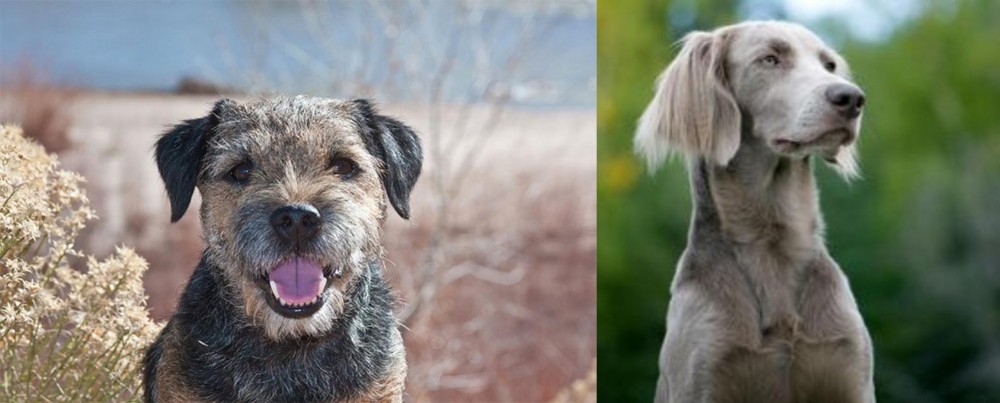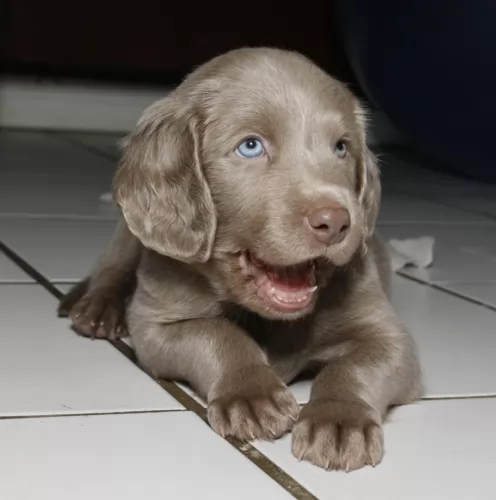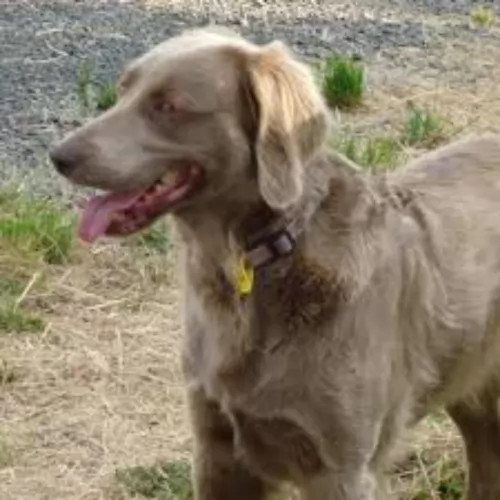 Petzlover
Petzlover Border Terrier is originated from United Kingdom but Longhaired Weimaraner is originated from Germany. Border Terrier may grow 30 cm / 11 inches shorter than Longhaired Weimaraner. Border Terrier may weigh 33 kg / 72 pounds lesser than Longhaired Weimaraner. Both Border Terrier and Longhaired Weimaraner has almost same life span. Both Border Terrier and Longhaired Weimaraner has same litter size. Both Border Terrier and Longhaired Weimaraner requires Moderate Maintenance.
Border Terrier is originated from United Kingdom but Longhaired Weimaraner is originated from Germany. Border Terrier may grow 30 cm / 11 inches shorter than Longhaired Weimaraner. Border Terrier may weigh 33 kg / 72 pounds lesser than Longhaired Weimaraner. Both Border Terrier and Longhaired Weimaraner has almost same life span. Both Border Terrier and Longhaired Weimaraner has same litter size. Both Border Terrier and Longhaired Weimaraner requires Moderate Maintenance.
 As a working dog, the Border Terrier comes from the border country between England and Scotland. To be more specific, the dog originates from the rough hill country in the areas on both sides of the border between England and Scotland – an area known as 'The Border Country'. The breed was developed by the farmers, using the Terriers to help contain the fox population.
As a working dog, the Border Terrier comes from the border country between England and Scotland. To be more specific, the dog originates from the rough hill country in the areas on both sides of the border between England and Scotland – an area known as 'The Border Country'. The breed was developed by the farmers, using the Terriers to help contain the fox population.
It is believed that they are related to other kinds of terriers which also came from this region such as the Bedlington- and Dandie Dinmont Terriers. The first Border Terrier was registered in 1913 with the British Kennel Club. Later, the Border Terrier Club was also formed. A club for these dogs was also registered in the United States in 1930.
 You may be used to the sleek, silver shorthaired Weimaraner, but did you know you get a beautiful long haired version too? Known also as the Long Coated Weimaraner or the ‘Gray Ghost’, with its mesmerising amber eyes, the less common long haired variety shares a similar history as the more familiar short haired version.
You may be used to the sleek, silver shorthaired Weimaraner, but did you know you get a beautiful long haired version too? Known also as the Long Coated Weimaraner or the ‘Gray Ghost’, with its mesmerising amber eyes, the less common long haired variety shares a similar history as the more familiar short haired version.
The dog originates in Germany and was developed to be a hunting dog. It is believed that the silver dog dates back to the early 1800’s, and in 1897 the first breed club in Germany was formed to protect the future of this dog.
The longhair coat is recognized in all countries except the American Kennel Club.
 The Border Terrier is a small to medium sized dog, weighing roughly between 5- and 7kg and standing at anything between 28 and 40cm in height. With his dark brown eyes and keen, alert expression, and with ears dropping forward, people describe the head as being like that of an otter. He is a courageous worker and a loyal companion but some people may not take kindly to him wanting to dig under-, or climb over barriers to get out to follow a scent or to go exploring.
The Border Terrier is a small to medium sized dog, weighing roughly between 5- and 7kg and standing at anything between 28 and 40cm in height. With his dark brown eyes and keen, alert expression, and with ears dropping forward, people describe the head as being like that of an otter. He is a courageous worker and a loyal companion but some people may not take kindly to him wanting to dig under-, or climb over barriers to get out to follow a scent or to go exploring.
The Border Terrier is a rough coated dogs of medium size with narrow build. The dog’s height is slightly greater than the dog’s length. The coat can be tan and black or dark grey. Sometimes the coat is described as grizzle - dark tipped hairs which give an overlay of color to the tan or red coat. You can also possibly find some white on the muzzle or chest. He has a double coat, with the outer coat being short, dense and wiry. The tail is of medium length and the ears drop forward toward their cheeks.
 The Longhair Weimaraner with its eye-catching grey coat is a large dog that stands between 58 and 70cm and weighs between 25 to 40kg.
The Longhair Weimaraner with its eye-catching grey coat is a large dog that stands between 58 and 70cm and weighs between 25 to 40kg.
These dogs, unlike the short haired version, have the tail traditionally long and the tail is feathered. The eyes are a blue-green, amber or grey color. The grey coat is soft and silky and even though it is quite long, a brush twice a week will keep it in tip-top condition.
The Longhaired Weimaraner’s temperament is the same as the short haired variety. He is also a superb field dog with excellent hunting skills.
They’re very active dogs, looking for plenty of mental and physical stimulation. For first-time dog owners, this might prove to be too demanding, so the long haired Weimaraner might not be the best first-choice dog to get.
They can be aggressive when meeting new people and he will certainly require training and socialization if you want him to be calm and obedient.
 A Border Terrier is a dog that has to be part of the family. You can’t just stick him in your back yard as he will just pine away with unhappiness. Boredom and loneliness will cause him to bark and he has a loud bark. He’ll become destructive – characteristics that aren’t his fault because he didn’t ask to be bought and just stuck away.
A Border Terrier is a dog that has to be part of the family. You can’t just stick him in your back yard as he will just pine away with unhappiness. Boredom and loneliness will cause him to bark and he has a loud bark. He’ll become destructive – characteristics that aren’t his fault because he didn’t ask to be bought and just stuck away.
Train and socialize your Border Terrier so that he becomes the great dog he is intended to be. He gets on well will children who have been taught to be kind to animals and he will get along with other pets in the home. The Border Terrier is an affectionate, sensitive dog and once trained he is willing to obey your commands.
The Border Terrier isn’t the greatest guard dog but is best known for his loving, devoted and loyal nature. He loves his food, and if you feed him well, provide him with a warm, dry place to sleep and provide him with lots of attention and exercise, you’ll have the most devoted and loving friend for life.
 Your Long Haired Weimaraner is a friendly, alert dog that makes for an excellent companion and watchdog. The fact that he is also restless, confident, independent and strong-willed means that training and socialization will be necessary to make him pleasant and obedient.
Your Long Haired Weimaraner is a friendly, alert dog that makes for an excellent companion and watchdog. The fact that he is also restless, confident, independent and strong-willed means that training and socialization will be necessary to make him pleasant and obedient.
You can’t always count on him to be amicable as he also has a bit of an aggressive side.
The way your Long Haired Weimaraner turns out will depend on heredity, the personality of the owner as well as training and socialization.
These dogs want to be with their human family and will follow the owner around and contentedly lie at their feet. Once he's trained, the Weimaraner is guaranteed to make you a fine family companion.
 Border Terriers are a healthy breed and with good food and plenty of love and attention, they can reach 14 years of age. It is to be noted with this dog breed that he doesn’t show signs of pain or sickness easily so you want to watch him closely.
Border Terriers are a healthy breed and with good food and plenty of love and attention, they can reach 14 years of age. It is to be noted with this dog breed that he doesn’t show signs of pain or sickness easily so you want to watch him closely.
Canine Epileptoid Cramping Syndrome - This is a disease which can be evident from 7 months of age already. The disease was once known as Spike's Disease, and its an hereditary disease of Border Terrier dogs. The cause of the disease is unknown but it is similar to canine epilepsy. It is thought that a contributing factor can be gluten, so a gluten-free diet will be recommended.
Heart defects can also affect Border Terriers, one of which is pulmonic stenosis. This is a narrowing of the valve which separates the right chamber of the heart from the lungs. It can ultimately lead to arrhythmia to congestive heart failure. He’ll have difficulty with breathing, suffer from abdominal distension and won’t be able to exercise properly.
 Hip Dysplasia is a medical threat to all dog breeds and fortunately the Weimaraner is a dog breed that has a low rate of dysplasia. When buying a Long Haired Weimaraner, try and get one from breeders who have had their breeding dogs hip-tested.
Hip Dysplasia is a medical threat to all dog breeds and fortunately the Weimaraner is a dog breed that has a low rate of dysplasia. When buying a Long Haired Weimaraner, try and get one from breeders who have had their breeding dogs hip-tested.
You’ll notice that the Weimaraner is a deep-chested dog and he is prone to bloating, which can turn out to be life threatening for your dog if not treated immediately.
The stomach twists and is swollen with no bowel movements. The dog is restless and in distress and needs immediate attention. To help, instead of giving one large meal which is gobbled up quickly, give him 2 smaller meals.
Skin allergies are also quite common in these dogs and you don’t want your silver dogs coat going off as it is his crowning glory.
If he is scratching, his skin is dry, red and itchy, get him to the vet as it can even be parasites at work, causing an allergic reaction.
 Because the topcoat of the Border Terrier is dense and harsh with a thick undercoat, he will require moderate grooming. He doesn’t shed too much. Brush your Border Terrier twice a week to remove dead hair and keep your dog’s coat healthy. As part of his grooming, keep his nails clipped as well as his teeth checked and brushed at least twice a week. Make use of specialized dog toothpaste and brush.
Because the topcoat of the Border Terrier is dense and harsh with a thick undercoat, he will require moderate grooming. He doesn’t shed too much. Brush your Border Terrier twice a week to remove dead hair and keep your dog’s coat healthy. As part of his grooming, keep his nails clipped as well as his teeth checked and brushed at least twice a week. Make use of specialized dog toothpaste and brush.
The Border Terrier can quickly put on weight so it is important to feed him according to the instructions on the packaging if you’re going to be feeding him with commercially manufactured dog food. Make sure its a quality brand and one which caters for his energy requirements.Dogs are individuals, and they don’t all eat the same amount. As a responsible dog owner, it is up to you to monitor your pet and understand his unique requirements.
 When you bring a Long Haired Weimaraner home, you will need to invest in brush and comb for his long hair. They’re active dogs and love nothing more than running in a field, rolling in mud and being very active.
When you bring a Long Haired Weimaraner home, you will need to invest in brush and comb for his long hair. They’re active dogs and love nothing more than running in a field, rolling in mud and being very active.
His coat will need to be brushed at least twice a week to keep it looking silvery and shimmering. Check the ears, eyes and teeth whenever you brush him and get used to cleaning his teeth regularly too.
If in doubt about how to keep your pet well groomed in terms of looks and health, speak to a dog expert, your vet or professional groomer.
Your ‘Gray Ghost’ dog has been a very successful hunting dog, and they are high-energy gun dogs. As a large dog he will have particular nutritional needs to fuel his energetic lifestyle.The dog’s high activity levels need to be taken into account when looking at his diet.
Buy the best commercially manufactured food. Add to his kibble some cooked chicken, brown rice or pasta and cooked or raw vegetables from time to time as well as bits of raw meat. Your dog will thank you for keeping his meals simple but nutritious.